
Oido Pensante
Scope & Guideline
Exploring the Soundscape of Cultural Studies
Introduction
Aims and Scopes
- Interdisciplinary Exploration of Music and Society:
The journal emphasizes the interplay between music and various societal factors, exploring how music acts as a form of social expression and cultural identity. - Focus on Cultural and Historical Contexts:
Research published in 'Oido Pensante' frequently situates musical practices within broader cultural and historical frameworks, highlighting the significance of context in understanding musical phenomena. - Innovative Methodologies in Music Research:
The journal showcases a range of methodologies, from qualitative ethnographic research to semiotic analysis, reflecting a commitment to advancing musicology as a dynamic and evolving field. - Engagement with Contemporary Issues:
Papers often address pressing contemporary themes such as globalization, migration, and the impact of technology on music, making the journal relevant to current debates in the field. - Exploration of Identity and Resilience through Music:
The journal features studies that investigate how music serves as a medium for expressing identity, resilience, and cultural memory, particularly in marginalized communities.
Trending and Emerging
- Impact of Technology on Music:
There is a growing focus on how technology, including artificial intelligence and digital platforms, influences music creation, distribution, and consumption, highlighting the relevance of these themes in today's music landscape. - Music and Identity in Migration Contexts:
Research increasingly addresses the role of music in expressing and negotiating identity within migration experiences, underscoring the importance of cultural memory and resilience. - Intersections of Music with Other Art Forms:
Emerging themes explore the connections between music and other artistic expressions, such as film and visual arts, indicating a trend towards interdisciplinary research. - Cultural Resistance and Political Expression:
Recent papers delve into how music serves as a form of resistance against political and cultural oppression, reflecting the journal's engagement with socio-political issues. - Listening Practices and Music Analysis:
There is an increasing emphasis on innovative listening practices and their implications for music analysis, suggesting a shift towards more experiential and participatory approaches in musicology.
Declining or Waning
- Traditional Music Studies:
There has been a noticeable decrease in research centered around traditional music forms, possibly indicating a shift towards more contemporary and globalized musical expressions. - Purely Historical Musicology:
The journal has moved away from purely historical analyses of music, suggesting a preference for interdisciplinary approaches that connect history with contemporary social issues. - Focus on Classical Music:
Papers exclusively centered on classical music and its historical contexts have become less frequent, indicating a broader interest in popular and world music genres. - Sociological Perspectives on Music:
While sociological aspects of music were once a prominent theme, recent publications suggest a waning interest in sociological frameworks in favor of more integrated approaches.
Similar Journals
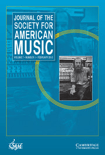
Journal of the Society for American Music
Documenting the Evolution of American Musical LandscapesThe Journal of the Society for American Music is a leading academic journal dedicated to the study of American music and its diverse cultural contexts. Published by Cambridge University Press, this journal serves as a vital platform for researchers and professionals in the fields of musicology, ethnomusicology, and American studies, contributing significantly to scholarly discourse and advancing knowledge in these areas. With an impressive impact factor reflecting its academic rigor, it is placed in Q2 of the music category as of 2023 and ranks #55 out of 180 in the Arts and Humanities segment, placing it in the 69th percentile among its peers. Since its inception, the journal has published a wealth of articles, reviews, and critical studies that explore the rich tapestry of American musical traditions from historical and contemporary perspectives. It operates under a subscription model, ensuring a wide distribution and accessibility to its important findings. Researchers, students, and professionals alike will find the journal an essential resource for advancing their understanding of the dynamic landscape of American music.
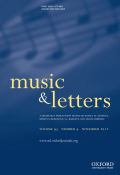
MUSIC & LETTERS
Charting New Territories in Music and Literary StudiesMUSIC & LETTERS, published by Oxford University Press, is a prominent academic journal that has been at the forefront of musicology and music studies since its inception in 1920. With an ISSN of 0027-4224 and an E-ISSN of 1477-4631, the journal provides a platform for scholarly articles that explore the rich interplay between music and literature, contributing significantly to the understanding of musical context, form, and societal impact. As of 2023, it holds a respectable Q3 rank in Music within its category, positioned at Rank #66 out of 180 in the Scopus Arts and Humanities Music category. Despite not being an Open Access journal, its rigorous peer-review process and commitment to high-quality research make it an essential resource for researchers, professionals, and students alike. The journal's scope encompasses various genres and historical periods, ensuring a comprehensive examination of music's role in culture and community, thereby enhancing the scholarly discourse within this vibrant field. Based in the United Kingdom, at Great Clarendon St, Oxford OX2 6DP, England, MUSIC & LETTERS continues to inspire and inform the global music scholarly community.

Musicologist
Exploring the Depths of Music ScholarshipMusicologist is a premier academic journal dedicated to the exploration and analysis of music theory, history, and practice, published by the esteemed Trabzon University State Conservatory in Turkey. With an ISSN of 2618-5652, this journal has been a vital platform for scholars since its inception in 2019, reflecting a commitment to fostering innovative research in the field of music. Recognized for its quality, the journal currently holds a Q2 ranking in the music category for 2023, placing it within the top segments of its discipline, as evidenced by its position at #72 out of 180 in the Scopus rankings, representing the 60th percentile. Although the journal employs a traditional publication model, it serves as a crucial repository for contemporary musicological discourse, aiming to advance knowledge and understanding within a vibrant academic community. Musicologist is not only a resource for seasoned researchers but also an invaluable tool for students and professionals alike, nurturing a comprehensive appreciation of music as an art form and scholarly pursuit.
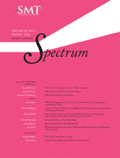
MUSIC THEORY SPECTRUM
Unveiling the Spectrum of Musical UnderstandingMUSIC THEORY SPECTRUM, published by Oxford University Press, serves as a premier journal in the field of music theory, recognized for its significant contributions and scholarship since its inception. With an ISSN of 0195-6167 and E-ISSN 1533-8339, this journal has established a distinguished position within the academic community, boasting an impressive Q1 status in the Music category for 2023 and ranking #17 out of 180 in Scopus for Arts and Humanities, Music, placing it within the 90th percentile. Despite its non-open access format, MUSIC THEORY SPECTRUM offers a wealth of research articles, reviews, and theoretical discussions aimed at both seasoned scholars and students alike. It spans from 1981 until present, fostering critical engagement and advancing understanding within the discipline. Researchers and music theorists will find this journal an invaluable resource for the latest insights and methodologies in music theory.
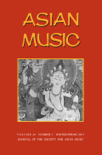
ASIAN MUSIC
Illuminating the Diversity of Asian Sound Practices.ASIAN MUSIC is a distinguished academic journal published by University of Texas Press, focusing on the rich and diverse musical traditions of Asia. With an ISSN of 0044-9202 and an E-ISSN of 1553-5630, this journal serves as a key platform for interdisciplinary research that encompasses musicology, ethnomusicology, and cultural studies related to Asian music practices. While ASIAN MUSIC is not an open-access journal, it provides valuable insights and scholarly articles that contribute significantly to the understanding of music’s role within Asian cultures. The journal originally covered works from 2002 to 2010 and has a reputation for fostering discussions that celebrate the intricacies of sound, performance, and society. Targeting researchers, professionals, and students alike, ASIAN MUSIC stands as a crucial resource for those engaged in the study of music in its multifaceted context.

Muzikoloski Zbornik
Elevating Musicology to New HeightsMuzikoloski Zbornik is a prominent open-access journal in the field of musicology, published by the esteemed University of Ljubljana Press since 1965. Hailing from Slovenia, this journal has been dedicated to advancing the study of musical heritage, theory, and practice, serving as a vital platform for researchers, professionals, and students alike. With a notable Q2 category ranking in the field of music and a Scopus ranking of 109 out of 180 in Arts and Humanities, Muzikoloski Zbornik showcases high-quality research, fostering discourse and collaboration among scholars globally. The journal embraces a diverse range of topics, from ethnomusicology to music education, ensuring its relevance in an ever-evolving academic landscape. By providing unrestricted access to its content, it champions the dissemination of knowledge and supports the growth of the musicology discipline.
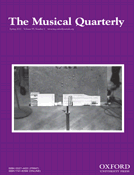
MUSICAL QUARTERLY
Championing High-Quality Music Research Since 1915MUSICAL QUARTERLY, published by Oxford University Press Inc, is a distinguished journal in the field of music, with a publication history that stretches back to 1915. This esteemed journal, identifiable by its ISSN 0027-4631 and E-ISSN 1741-8399, provides a critical platform for scholarly discourse, analysis, and research in musicology and related disciplines, facilitating an understanding of both historical and contemporary musical practices. Although it operates without open access, it continues to attract a diverse readership of researchers, educators, and students alike, thanks to its well-curated articles and reviews that engage with music theory, history, and ethnomusicology. With a current Scopus rank of #119 out of 180 in the Arts and Humanities category and a 34th percentile ranking in Music, MUSICAL QUARTERLY plays a vital role in advancing knowledge and fostering collaboration within the music academic community. Its commitment to high-quality scholarship is reflected in its ongoing efforts to address the evolving landscape of music studies, making it an essential resource for anyone serious about exploring the rich tapestry of music scholarship.
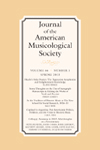
JOURNAL OF THE AMERICAN MUSICOLOGICAL SOCIETY
Exploring the depths of musical understanding.JOURNAL OF THE AMERICAN MUSICOLOGICAL SOCIETY, published by University of California Press, is a prestigious peer-reviewed journal dedicated to advancing the field of musicology. With an ISSN of 0003-0139 and E-ISSN 1547-3848, this journal has been a cornerstone of scholarly communication since its inception in 1970 and continues to be relevant through 2024. Its esteemed standing is reflected in its Q2 ranking in the Music category and a respectable 71/180 ranking in the Arts and Humanities discipline, placing it in the 60th percentile among its peers. The journal provides an essential platform for researchers, professionals, and students to explore diverse topics in musicology, ranging from historical studies to contemporary analyses. While it does not currently offer Open Access options, its rigorous editorial standards ensure the publication of high-quality research that contributes significantly to the academic dialogue in music studies. With its address based in the United States at 155 Grand Ave, Suite 400, Oakland, CA 94612-3758, the journal remains a vital resource for those seeking to deepen their understanding of the complexities of music and its societal impacts.

FONTES ARTIS MUSICAE
Elevating the study of music and library sciences.FONTES ARTIS MUSICAE, with ISSN 0015-6191 and E-ISSN 2471-156X, is a distinguished journal published by A-R EDITIONS, specializing in the fields of Music and Library and Information Sciences. Established in the United States, this journal serves as a vital resource for scholars, practitioners, and students engaged in the exploration and analysis of music and its associated disciplines. With an established converged publication history from 2002 to 2024, FONTES ARTIS MUSICAE has consistently contributed to the discourse within its scope, reflected in its current quartile rankings of Q4 in Library and Information Sciences and Q3 in Music for 2023. Although not an open-access journal, it offers essential insights and research findings, appealing to a diverse academic audience. Its position within the 18th percentile of the Arts and Humanities (Music) category and 11th percentile in Library and Information Sciences underscores its growing significance in these fields, making it a critical platform for advancing knowledge and fostering collaboration.

Debates
Igniting Conversations in MusicologyDebates is a pioneering journal published by PROGRAMA POS-GRADUACAO MUSICA-PPGM, dedicated to advancing scholarly dialogue in the field of music studies. With an ISSN of 1414-7939 and an E-ISSN of 2359-1056, Debates serves as a vital platform for researchers, professionals, and students to explore contemporary issues, theoretical frameworks, and interdisciplinary approaches within musicology. Located in the vibrant cultural backdrop of Rio de Janeiro, Brazil, this journal aims to foster critical discourse and cross-cultural understanding in music. Although currently not indexed in major databases, the journal is committed to contributing valuable insights to the academic community, making it an essential resource for those seeking to deepen their knowledge and engage with the latest trends in music studies.